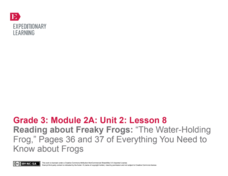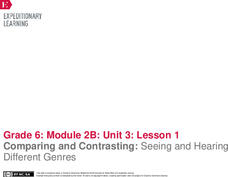National Endowment for the Humanities
“Every Day We Get More Illegal” by Juan Felipe Herrera
A study of Jan Felipe Herrera's poem "Every Day We Get More Illegal" opens the door for a discussion on immigration. To begin, class members examine the photograph "Desert Survival," record their observations of the image, and then...
Learning for Justice
Maya Angelou
Maya Angelou's poem, "Still I Rise", offers young scholars an opportunity to consider how poets use literary devices to create powerful messages. After a close reading and discussion of the poem, class members reflect on how they can...
Curated OER
ESL Poetry Unit
Students complete a twelve lesson unit on poetry. They read and respond to different forms of poetry, write a bio poem, complete an online WebQuest, and in small groups present lessons to the class on various types of poems.
Curated OER
Discovering Angel Island: The Story Behind the Poems
Learners watch a video titled Discovering Angel Island: The Story Behind the Poems about immigrants that came through Angel Island. In this Angel Island lesson plan, students respond with a journal entry.
Curated OER
Henry Wadsworth Longfellow's Christmas Bells
Students read and analyze the anti-slavery poem, "Christmas Bells" by Henry Wadsworth Longfellow. They discuss the content and form of the poem, write an essay, write an original poem, examine how this anti-slavery poem was converted...
Curated OER
Using Prepositional Phrases
The class reads the book Heckedy Peg. Stopping to point out the prepositional phrases, the teacher models and guides the young scholars to deeper comprehension. Small groups collaborate to read A Sweet Smell of Roses. They thenfind the...
EngageNY
End of Unit Assessment: On-Demand Informational Paragraph About How the Poison Dart Frog Survives
A final assessment marks the end of a unit that takes a close look at a variety of informational texts all about frogs. A graphic organizer aides scholars in planning an accordion paragraph using their recorder forms from previous...
Curated OER
I Spy Poetry
Explore the components of rhythm and form through a reading of Jean Marzollo's I Spy books. After discussing Marzollo’s format, the class agrees upon a theme for a class book and topics that fit with that theme. Pupils write a poem,...
EngageNY
Looking Closely at Stanza 1—Identifying Rules to Live By Communicated in “If”
Here is a lesson plan in which pupils connect themes and rules to live by from the story Bud, Not Buddy by Christopher Paul Curtis to those found in the poem If by Rudyard Kipling. First, scholars discuss their reading and review Bud's...
EngageNY
Introducing “If” and Noting Notices and Wonders of the First Stanza
After reading chapter 14 of the story Bud, Not Buddy by Christopher Paul Curtis, scholars take part in a read-aloud of the poem If by Rudyard Kipling and compare it to the reading of Bud, Not Buddy. Learners then go deeper into the poem...
EngageNY
Notices, Wonders, and Vocabulary of the Third Stanza of “If”
How does one's experience reading a poem's text differ from listening to its audio version? Delve into the insightful question with the poem, If by Rudyard Kipling, as pupils compare and contrast their experience using a note-taking...
EngageNY
Reading about Freaky Frogs: “The Water-Holding Frog"
Boost reading comprehension skills with a lesson plan all about freaky frogs. A poem hooks scholars and takes them into a reading of an informational text followed by peer discussions. A three-page worksheet focuses on text features and...
EngageNY
Looking Closely at Stanza 3—Identifying Rules to Live By Communicated in “If”
Just as Bud, from the novel Bud, Not Buddy by Christopher Paul Curtis, had rules to live by, so does the poem, If by Rudyard Kipling, but how do the two relate? Pupils delve deep into the poem's third stanza, participate in a grand...
EngageNY
Comparing and Contrasting: Seeing and Hearing Different Genres
Let's compare and contrast! Scholars use a Venn diagram to compare and contrast the experience of reading a poem and listening to its audio version. Next, they complete graphic organizers, comparing two different genres: a poem and a...
EngageNY
Analyzing, Comparing, Sharing: Modern Voices
What do modern voices sound like? Scholars explore the topic, reading two concrete poems from John Grandit's Blue Lipstick and analyzing them using a graphic organizer. Next, they read a third poem and work with partners to look for...
EngageNY
Analyzing and Discussing: Modern Voices
This is the way we go to school. Scholars take a look at two poems about different ways to get to school, TyrannosaurBus Rex and Point A to Point B. Pupils work in triads to analyze the poem images and determine the theme.
Curated OER
Life Reflections in Songwriting and Poetry
Learners analyze, discuss and compare sources of inspiration, use of words and imagery, and other differences in writing styles between two featured songwriters. This is an introductory lesson to a creative project unit.
EngageNY
Reading about Freaky Frogs: “The Glass Frog”
Freaky frogs are the focus of a lesson plan designed to boost reading comprehension skills using text features and asking and answering questions. Informational text and a poem supply scholars with animal-related vocabulary and facts. A...
Curated OER
A Journey To Japan Through Poetry
Third graders gain an appreciation for writing, analyzing, reading and listening to poetry, viewing poems as a motivation for studying Japanese culture and tradition. They study and create their own haiku and tanka poems with illustrations.
Curated OER
Poems That Work!
Students are introduced to the elements of poetry. As a class, they practice the correct way to read a poem and determine the author's audience. They identify similies and metaphors and determine the rhyme and meter. To end the...
Curated OER
Poems and Translation (from Spanish to English)
Students read and are read various poems in their native language of Spanish. In groups or individually, they translate the poems into English and practice speaking English by reading them to the class. They answer comprehension...
Curated OER
Poetry Writing
Students read various examples of poetry and create a poetry portfolio. In this poetry writing lesson, students work at their own pace to complete a poetry portfolio with examples of the different poetic forms demonstrated. Students...
Curated OER
An Irritiating Creature - a poetry lesson
Students think about and evaluate the meaning of a poem. It also encourages students to be original and creative in their thinking as they read, analyze and illustrate their story.
Curated OER
Getting-to-Know-You List Poem
Students construct a list poem. In this poetry lesson, students discuss their likes and dislikes and summarize their thoughts into a list poem.
Other popular searches
- 6th Grade Poetry Unit
- 2nd Grade Poetry Unit
- 3rd Grade Poetry Unit
- 7th Grade Poetry Unit
- 5th Grade Poetry Unit
- Poetry Unit Plans
- Poetry Unit Grade Three
- Modern Poetry Unit
- Poetry Unit Rhyme
- Huge Poetry Unit
- African American Poetry Unit
- Poetry Unit Jack Prelutsky

























